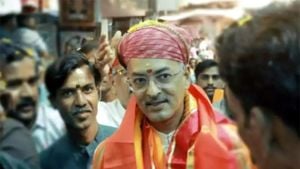On September 18, 2024, the U.S. Capitol was abuzz with celebration as it hosted the Congressional Gold Medal Ceremony honoring four remarkable African American women who played pivotal roles at NASA during the space race. Katherine Johnson, Dr. Christine Darden, Dorothy Vaughan, and Mary W. Jackson, often referred to as the "Hidden Figures," were recognized for their groundbreaking contributions to the United States' aeronautics and space programs, contributions magnificently portrayed in the 2016 film "Hidden Figures." Amid heartfelt speeches, the ceremony underscored both their legacy and the barriers they overcame as women of color in the STEM fields.
House Speaker Mike Johnson, alongside members from both political parties, presented the medals to Johnson's daughters, Joylette Hylick and Katherine Moore, who accepted the honor on behalf of their mother. The ceremony served not just as a recognition of their achievements but as a reminder of the persistent underrepresentation of women and people of color within the scientific community.
U.S. Senator Shelley Moore Capito from West Virginia, who championed the legislation to award the medals, expressed deep appreciation during her remarks. She noted, "The Congressional Gold Medal is the highest honor this nation can bestow. Today, we honor not only Katherine Johnson but all women who broke barriers and shaped our history." Capito's commitment extended beyond the ceremony; she has been active in advocating for the renaming of the NASA IV&V Facility in Fairmont, West Virginia, to honor Johnson's legacy.
Katherine Johnson, born on August 26, 1918, exhibited mathematical brilliance from an early age. She calculated the trajectories for pivotal missions, including the 1961 Freedom 7 launch with Alan Shepard—the first American to travel to space—and verified the calculations for John Glenn’s historic Friendship 7 mission, which made him the first American to orbit the Earth. Johnson's career spanned over three decades, during which she was instrumental during the Apollo missions, contributing to missions between the 1930s and 1970s at NASA.
During the ceremony, House Representative Frank Lucas of Oklahoma, who co-sponsored the original legislation, emphasized the historical significance of recognizing these women at the Capitol. He remarked, "Without their mathematical skills and insights, many early successes of our space program might have looked very different." His sentiment echoed throughout the event, blending celebration with historical reflection.
The event highlighted the importance of representation, particularly for women and African Americans. During their careers, Johnson, Darden, Vaughan, and Jackson faced significant racism and sexism. Their triumphs serve as powerful examples to the younger generations, demonstrating how grit, determination, and skill can defy the odds.
Dr. Christine Darden, another key figure who supervised programs involving NASA’s aerodynamic and aerothermodynamic activities, also shared her story. After working at NASA for 40 years, she authored the book "When the Wind Blows – New Insights on the Wind Tunnel.", which addresses the importance of accurate wind tunnel measurements. "Being here today is like coming full circle, knowing we are part of history," she stated during her acceptance speech.
Dalton-Holdman Flowers, descendant of Vaughan and Johnson's niece, spoke passionately about how these honors inspire young Black women today. "This isn’t just history, this is legacy; it inspires today’s girls facing similar struggles. It shows them they can be next," Flowers asserted.
Vaughan was the first African American supervisor at NASA, paving the way for many who followed. She took the initiative to teach herself programming skillfully, ensuring she could contribute as technology began to change the field. Her legacy includes not only her contributions but her role as mentor to younger engineers.
Mary W. Jackson's work as the first female African American engineer at NASA is equally compelling. Her roles included advocating for more female engineers and taking up challenges traditionally reserved for men. Senator Capito remarked, "Their determination continues to push the boundaries of what’s possible," serving as both celebration and vow toward gender equity.
The hidden figures story continues to unravel, and such honors raise questions about who may still go unnoticed today within the STEM fields. Government officials, educators, and activists attending the event urged for more comprehensive initiatives to actively include underserved communities within these spaces.
Subsequent speeches featured wordy tributes. Minority Leader Hakeem Jeffries remarked, "It’s fitting, as we celebrate these women today, we also shed light on the systemic barriers still faced by many today. If their faith and perseverance can lead humanity to space, what could ours do for our communities?" His comments struck chords among attendees and served as calls for action to bolster educational pipelines for minorities.
The ceremony not only celebrated milestones; it served as both reflection and inspiration. Speakers underscored the continued relevance of their achievements, noting how modern science and engineering still benefit from the mathematical principles these women advanced. This legacy urges society to push beyond current barriers.
Most attendees, particularly those from educational sectors, felt a strong tie to the event. Dr. Mautra Jones, President of Oklahoma City Community College, noted, "This moment is not just about these four women but about those who continue to walk the same halls and classrooms today. It is for the generations to come."
Backed by various nonprofits and educational initiatives, the momentum from this ceremony is expected to inspire future collaborations aimed at removing barriers for minoritized students pursuing STEM education. Speaker Mike Johnson, who later met with families of the honorees, encapsulated the sentiments of many present, declaring, "The award today signifies the journeys of countless women who have equally contributed, yet have remained unnamed—no longer hidden but celebrated for the world to see."
The event ended with moments of jubilation; as music played and people mingled, mingling echoed the true spirit of what it means to honor those who have so meaningfully contributed to the American legacy. For many, it wasn’t just about receiving medals; it was about affirming their rightful place within the narrative of history.
While the spotlight was on Johnson, Vaughan, Jackson, and Darden, this event served as a reminder of all the hidden figures yet to be discovered or recognized—reminding everyone present of the work still necessary to enrich and diversify the fields of science, technology, engineering, and mathematics for everyone.



